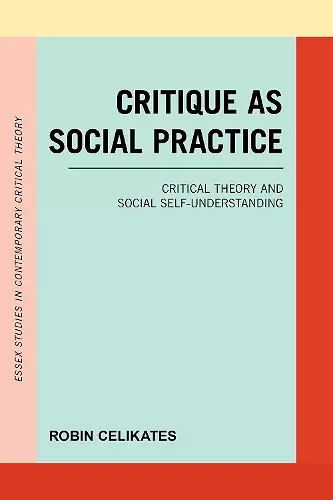Critique as Social Practice
Critical Theory and Social Self-Understanding
Robin Celikates author Naomi van Steenbergen translator
Format:Paperback
Publisher:Bloomsbury Publishing PLC
Published:10th Sep '19
Currently unavailable, and unfortunately no date known when it will be back
This paperback is available in another edition too:
- Hardback£113.00was £113.00(9781786604620)

Can critical theory diagnose ideological delusion and false consciousness from above, or does it have to follow the practices of critique ordinary agents engage in? This book argues that we have to move beyond this dichotomy, which has led to a theoretical impasse. Whilst ordinary agents engage in complex forms of everyday critique, it must remain the task of critical theory to provide analysis and critique of social conditions that obstruct the development of reflexive capacities and of their realization in corresponding practices of critique. Only an approach that is at the same time non-paternalistic, pragmatist, and dialogical as well as critical will be able to realize the emancipatory potential of the Frankfurt School tradition of critical theory in radically changing social circumstances.
The translation of this work was funded by Geisteswissenschaften International – Translation Funding for Humanities and Social Sciences from Germany, a joint initiative of the Fritz Thyssen Foundation, the German Federal Foreign Office, the collecting society VG WORT and the Börsenverein des Deutschen Buchhandels (German Publisher & Booksellers Association)
Celikates’s book is a
key part of an important resurgence in the tradition
of critical theory. Critique as Social Practice forms the
basis for Celikates’s more recent work on social
philosophy and civil disobedience, while also
providing important resources for the broader
scholarly conversation on critical theory and the place
of critique in the contemporary social and political
environment.
Celikates’ important contribution lies in outlining a methodological egalitarianism that overcomes the external-internal ‘dichotomy’ (108) and the limits of each approach. . . . Celikates’ work is an important contribution to the question of how critical theorists, given their emancipatory aims, should address the oppressed. * Marx and Philosophy Review of Books *
Celikates presents an insightful critical reconstruction of three influential models of the relation between the European, male critical theorist and the people about whom he theorises in the works of Bourdieu, Boltanski and psychoanalysis, and of the French-German debates around them. This fine translation makes this important contribution to the history of European critical theory available to English-language students and scholars. -- James Tully, Professor Emeritus, University of Victoria
How do we articulate the theoretical critique of the social order and the criticisms made by ordinary people in everyday life? The solution Celikates proposes, based on the Frankfurt School’s interpretation of psychoanalysis, is highly original and very promising. This is a fundamental work for all those wishing to take advantage of both the empirical study of society and the contributions of philosophy, from the perspective of social change. -- Luc Boltanski, Professor at the School for Advanced Studies in the Social Sciences, Paris
Critique as Social Practice takes up a crucial question for all those undertaking socially engaged academic work: under conditions of ideology, what epistemic standing does the critical theorist have in relation to those suffering injustice in whose name the theory is constructed? Celikates illuminates how external critique (drawing on insights and norms from other (theoretical, political) contexts) and internal critique (drawing on insights and norms of practitioners) are inadequate. He goes on to defend the idea of reconstructive critique that begins with the critical practices of those embedded in unjust systems, but also requires an evaluation of the adequacy of those practices, recognizing that injustice can also compromise our abilities to know. In Celikates' view, ideology critique is properly understood as second-order epistemic critique. It is a brilliant book that reframes the contemporary challenges of critical theory and offers a deeply compelling and nuanced response. -- Sally Haslanger, Ford Professor of Philosophy and Women's and Gender Studies, Massachusetts Institute of Technology
Celikates subjects the familiar refrain that critique is a form of practice to a systematic, rigorous, and illuminating analysis. His conception of reconstructive critique as a form of social practice shows as much respect for the critical capacities of agents as it does awareness of the dangers of ideological distortions. The result is a highly original and compelling articulation of the distinctive methodology of critical theory. -- Amy Allen, Liberal Arts Professor of Philosophy and Women's, Gender, and Sexuality Studies, The Pennsylvania State University,
ISBN: 9781786604637
Dimensions: 220mm x 153mm x 18mm
Weight: 367g
238 pages